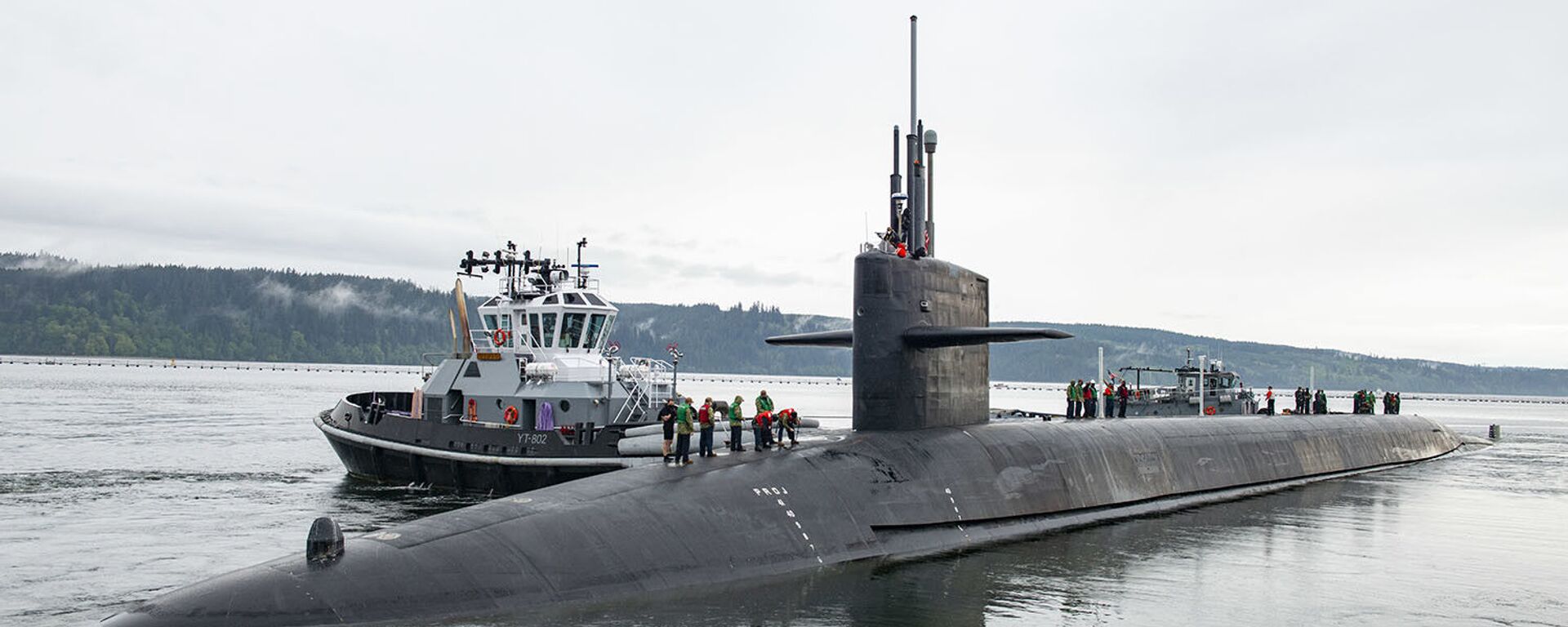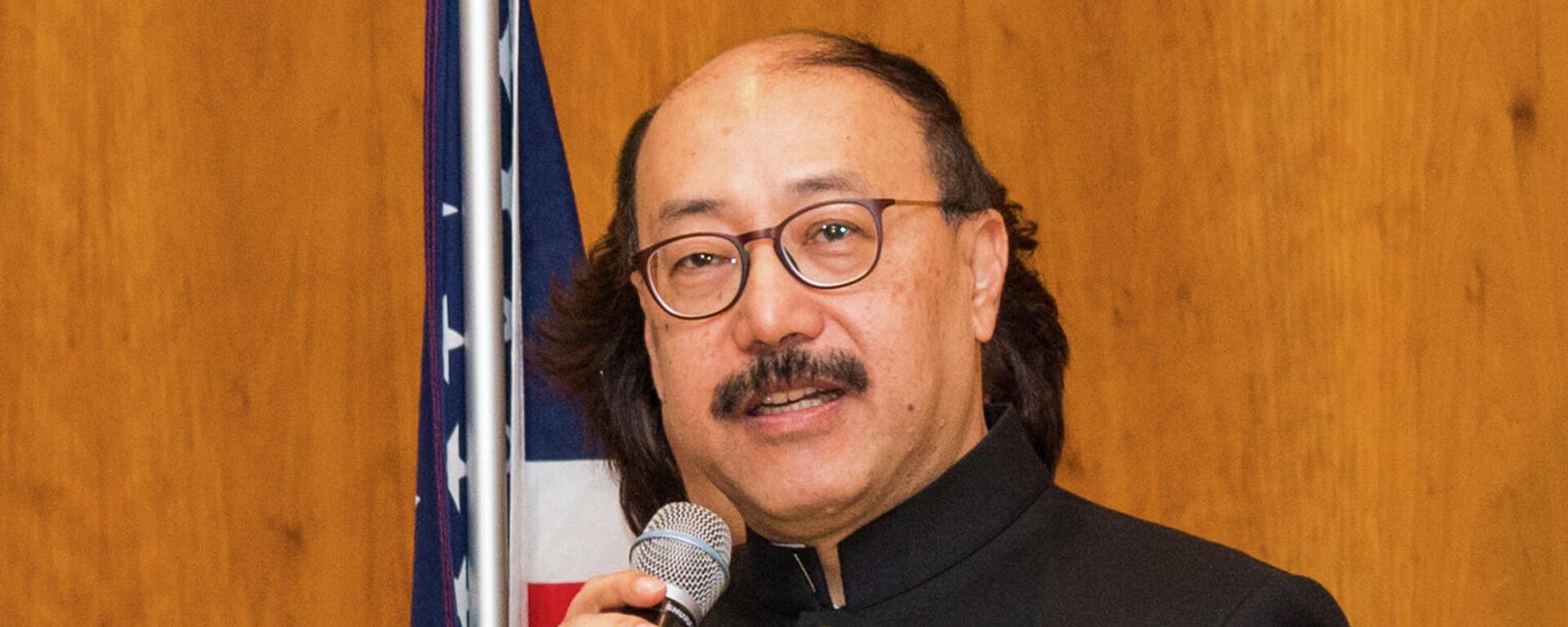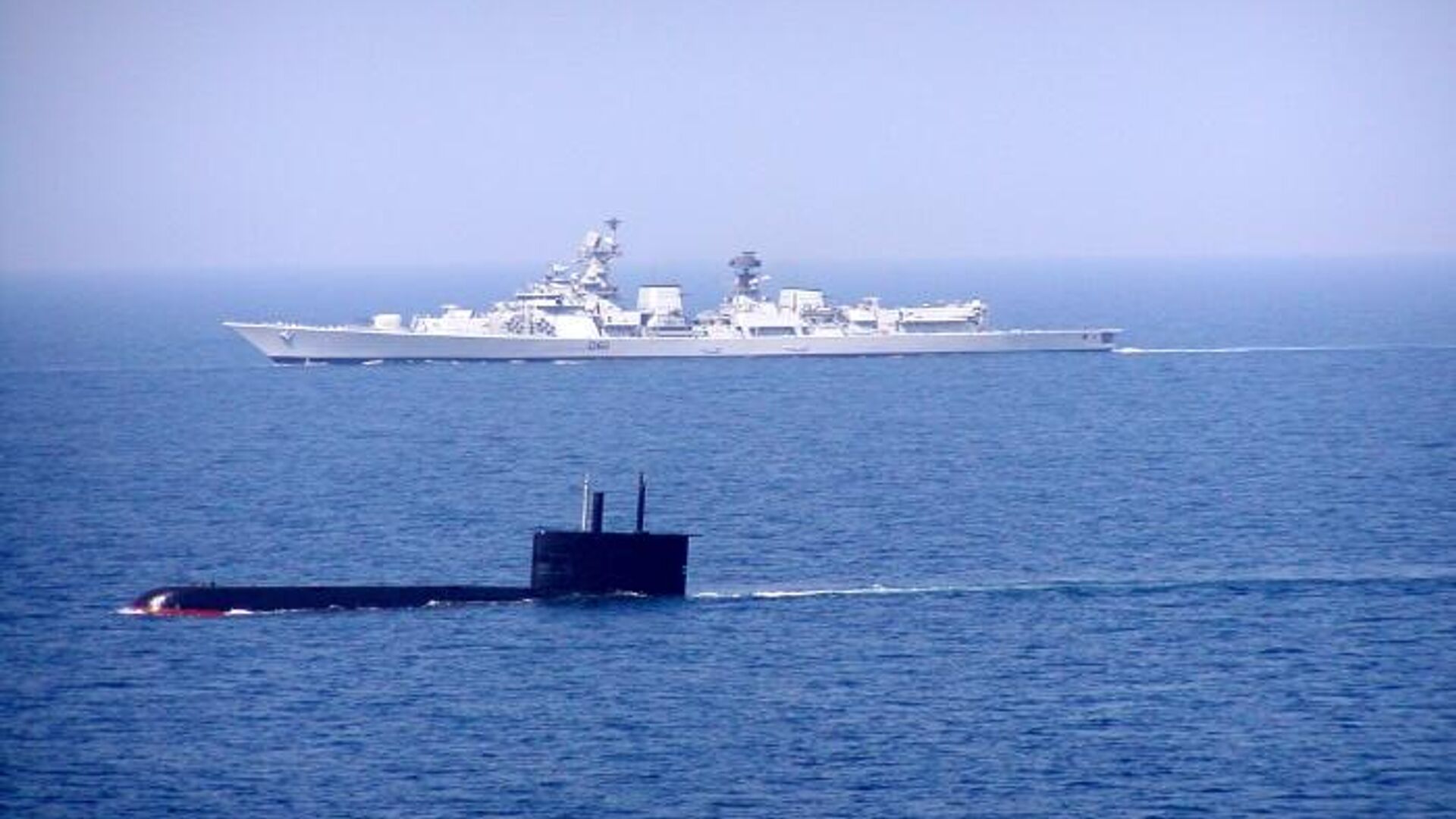https://sputnikglobe.com/20210924/india-central-to-frances-indo-pacific-vision-but-unlikely-to-get-nuclear-technology-says-expert-1089324307.html
India 'Central' to France's Indo-Pacific Vision, But Unlikely to Get Nuclear Technology, Says Expert
India 'Central' to France's Indo-Pacific Vision, But Unlikely to Get Nuclear Technology, Says Expert
Sputnik International
On 15 September, Australia, UK, and the US announced the AUKUS trilateral security partnership. The pact's first initiative will see Australia acquiring... 24.09.2021, Sputnik International
2021-09-24T19:49+0000
2021-09-24T19:49+0000
2022-07-19T10:39+0000
aukus
joe biden
narendra modi
emmanuel macron
asia
china
australia
scott morrison
subrahmanyam jaishankar
nuclear non-proliferation treaty (npt)
https://cdn1.img.sputnikglobe.com/img/07e5/09/12/1089178676_0:4:700:398_1920x0_80_0_0_bbd6c5fd266905c750e5c96a2ecf8147.jpg
While India has “always been central" to France's Indo-Pacific strategy, "non-proliferation" has been a "major focus" of Paris' and the European Union's engagements in the region, said Eva Pejsova, a political analyst specializing in the Indo-Pacific at Paris-headquartered think tank Fondation pour la Recherche Strategique, or Foundation for Strategic Research (FRS), in remarks to Sputnik.Pejsova, the leader of the Japan Programme at Vrije Universiteit Brussel (VUB), states that cooperation in security and defence has been flourishing and the two countries share a number of common objectives in the region. "It is no doubt we will see closer cooperation in the future.”The assessment is in line with the European Union's (EU) new Indo-Pacific Strategy, unveiled on 16 September.While the strategy document calls for “boosting Indo-Pacific partners’ capacity to ensure maritime security”, it also calls for “intensifying dialogues” among nations on “non-proliferation and disarmament”.However, a face-to-face meeting was held between French Foreign Minister Jean-Yves Le Drian and his Indian counterpart Subrahmanyam Jaishankar on the sidelines of the ongoing United Nations General Assembly (UNGA) in New York. It was followed by a telephone call between French President Emmanuel Macron and Indian Prime Minister Narendra Modi. All this sparked a renewed optimism in Indian strategic circles about the possibility of New Delhi acquiring the technology to build SSNs (nuclear-powered attack submarines) from Paris.The French Embassy in India has refused to comment on whether a discussion on the transfer of nuclear submarine technology took place during recent leadership interactions between the two nations.At present, the Indian Navy operates just one Arihant-class SSBN (nuclear-powered ballistic missile submarine) that it has on lease from Russia. While India is looking to develop at least six SSNs, based on advanced technology, by 2032, it does not as yet possess the expertise to execute a naval undertaking of this size.As reported by the India Today news outlet on 20 September, the Indian Navy has been upset about a US decision to transfer advanced nuclear submarine technology to Australia, even as it has denied the same to India for several decades. In doing so, Australia concurrently nixed a $66 billion contract with France, signed in 2016, for delivering conventionally-powered submarines.Consequent to the AUKUS pact, France also pulled out of a trilateral pact between New Delhi, Paris, and Canberra. The first India-France-Australia trilateral dialogue had been held in May, on the sidelines of the 2021 G-7 Foreign Ministers’ Meeting in London.Officially, New Delhi has denied that the AUKUS deal will have any impact on its ties with Washington, either on the bilateral level or in the Quadrilateral Security Dialogue comprising Australia, India, Japan and the US.“The QUAD has adopted a positive proactive agenda, with, as I said, a wide range of initiatives at the global level, to address some of the issues of the day. This includes dealing with the COVID-19 pandemic, including the supply of vaccines to the Indo Pacific region, it includes working on new and emerging technologies, working on issues like climate change, infrastructure, maritime security, education, humanitarian assistance and disaster relief,” Indian Foreign Secretary Harsh Vardhan Shringla said at a press briefing on 21 September. He was reacting to concerns expressed in India about AUKUS reducing the significance of the Quad.“On the other hand, AUKUS is a security alliance between three countries. From our perspective, this is neither relevant to the QUAD, nor will it have any impact on its functioning,” Shringla added.Pejsova, however, argues that the AUKUS grouping is “indeed not only about submarines”.Despite geopolitical friction over the deal, Pejsova says that it is important that countries unite to maintain a free and open Indo-Pacific.Concerns Over Nuclear ProliferationWhile India, which is reportedly seeking SSN technology for its own defence needs, has bought into Australian Prime Minister Scott Morrison's assurance that Canberra does not intend to acquire nuclear weapons, other regional governments, such as China, Malaysia, and Indonesia have expressed fears of a new arms race in the region.Malaysian Prime Minister Ismail Sabri Yaakob has called upon Australia to respect “Malaysia’s “existing stance and approach to nuclear-powered submarines”. Reuters reported on 22 September that Malaysian Defence Minister Hishammuddin Hussein had proposed an “immediate working trip” to China to discuss AUKUS.China, meanwhile, has accused the AUKUS of threatening regional stability through nuclear non-proliferation.
https://sputnikglobe.com/20210920/us-has-no-intention-to-extend-nuclear-powered-sub-support-to-other-countries-after-australia-1089246651.html
https://sputnikglobe.com/20210921/aukus-will-not-have-any-impact-on-quad-says-indian-foreign-secretary-ahead-of-leaders-summit-1089269522.html
https://sputnikglobe.com/20210920/not-a-defence-pact-australia-reassures-asean-as-malaysia-indonesia-see-red-over-aukus-1089227821.html
china
australia
Sputnik International
feedback@sputniknews.com
+74956456601
MIA „Rossiya Segodnya“
2021
News
en_EN
Sputnik International
feedback@sputniknews.com
+74956456601
MIA „Rossiya Segodnya“
Sputnik International
feedback@sputniknews.com
+74956456601
MIA „Rossiya Segodnya“
joe biden, narendra modi, emmanuel macron, china, australia, scott morrison, subrahmanyam jaishankar, nuclear non-proliferation treaty (npt), indian navy, quadrilateral security dialogue (quad), aukus
joe biden, narendra modi, emmanuel macron, china, australia, scott morrison, subrahmanyam jaishankar, nuclear non-proliferation treaty (npt), indian navy, quadrilateral security dialogue (quad), aukus
India 'Central' to France's Indo-Pacific Vision, But Unlikely to Get Nuclear Technology, Says Expert
19:49 GMT 24.09.2021 (Updated: 10:39 GMT 19.07.2022) On 15 September, Australia, UK, and the US announced the AUKUS trilateral security partnership. The pact's first initiative will see Australia acquiring nuclear technology from the US and the UK building at least eight submarines by 2040. Both France and the EU have slammed AUKUS, with Paris calling the new treaty a "stab in the back".
While India has “always been central" to France's Indo-Pacific strategy, "non-proliferation" has been a "major focus" of Paris' and the European Union's engagements in the region, said Eva Pejsova, a political analyst specializing in the Indo-Pacific at Paris-headquartered think tank Fondation pour la Recherche Strategique, or Foundation for Strategic Research (FRS), in remarks to Sputnik.
Pejsova, the leader of the Japan Programme at Vrije Universiteit Brussel (VUB), states that cooperation in security and defence has been flourishing and the two countries share a number of common objectives in the region. "It is no doubt we will see closer cooperation in the future.”
Asked whether France should help India with the development of advanced nuclear-propelled submarines, she said: "It is not excluded, New Delhi may raise the issue."
The assessment is in line with the European Union's (EU) new
Indo-Pacific Strategy, unveiled on 16 September.
While the strategy document calls for “boosting Indo-Pacific partners’ capacity to ensure maritime security”, it also calls for “intensifying dialogues” among nations on “non-proliferation and disarmament”.
However, a face-to-face meeting was held between French Foreign Minister Jean-Yves Le Drian and his Indian counterpart Subrahmanyam Jaishankar on the sidelines of the ongoing United Nations General Assembly (UNGA) in New York. It was followed by a telephone call between French President Emmanuel Macron and Indian Prime Minister Narendra Modi.
All this sparked a renewed optimism in Indian strategic circles about the possibility of New Delhi acquiring the technology to build SSNs (nuclear-powered attack submarines) from Paris.
The French Embassy in India has refused to comment on whether a discussion on the transfer of nuclear submarine technology took place during recent leadership interactions between the two nations.

20 September 2021, 16:01 GMT
At present, the Indian Navy operates just one Arihant-class SSBN (nuclear-powered ballistic missile submarine) that it has on lease from Russia.
While India is looking to develop at least six SSNs, based on advanced technology, by 2032, it does not as yet possess the expertise to execute a naval undertaking of this size.
As reported by the
India Today news outlet on 20 September, the Indian Navy has been upset about a US decision to transfer advanced nuclear submarine technology to Australia, even as it has denied the same to India for several decades. In doing so, Australia concurrently nixed a $66 billion contract with France, signed in 2016, for delivering conventionally-powered submarines.
Consequent to the AUKUS pact, France also pulled out of a trilateral pact between New Delhi, Paris, and Canberra. The first India-France-Australia trilateral dialogue had been held in May, on the sidelines of the 2021 G-7 Foreign Ministers’ Meeting in London.
Officially, New Delhi has denied that the AUKUS deal will have any impact on its ties with Washington, either on the bilateral level or in the Quadrilateral Security Dialogue comprising Australia, India, Japan and the US.
“The QUAD has adopted a positive proactive agenda, with, as I said, a wide range of initiatives at the global level, to address some of the issues of the day. This includes dealing with the COVID-19 pandemic, including the supply of vaccines to the Indo Pacific region, it includes working on new and emerging technologies, working on issues like climate change, infrastructure, maritime security, education, humanitarian assistance and disaster relief,” Indian Foreign Secretary Harsh Vardhan Shringla said at a press briefing on 21 September.
He was reacting to
concerns expressed in India about AUKUS reducing the significance of the Quad.
“On the other hand, AUKUS is a security alliance between three countries. From our perspective, this is neither relevant to the QUAD, nor will it have any impact on its functioning,” Shringla added.

21 September 2021, 16:06 GMT
Pejsova, however, argues that the AUKUS grouping is “indeed not only about submarines”.
“AUKUS partners still share the same core values and objectives in the Indo-Pacific with the QUAD: the promotion of freedom of navigation, trade and rule of law among others. That does not change,” Pejsova states.
Despite geopolitical friction over the deal, Pejsova says that it is important that countries unite to maintain a free and open Indo-Pacific.
“France, Europe at large, as well as the US, Australia, Japan, India and others share the core interest of preserving safety and stability in the Indo-Pacific based on freedom, openness and the rule of law. More than ever, it is important to keep that in mind,” she states.
Concerns Over Nuclear Proliferation
While India, which is reportedly seeking SSN technology for its own defence needs, has bought into Australian Prime Minister Scott Morrison's assurance that Canberra does not intend to acquire nuclear weapons, other regional governments, such as China, Malaysia, and Indonesia have expressed fears of a new arms race in the region.
Malaysian Prime Minister Ismail Sabri Yaakob has called upon Australia to respect “Malaysia’s “existing stance and approach to nuclear-powered submarines”.
Reuters reported on 22 September that Malaysian Defence Minister Hishammuddin Hussein had proposed an “immediate working trip” to China to discuss AUKUS.

20 September 2021, 14:18 GMT
China, meanwhile, has accused the AUKUS of threatening regional stability through nuclear non-proliferation.
“The AUKUS cooperation on nuclear submarines, which has serious risks of nuclear proliferation, once again proved that the US and the UK adopt double standards to use nuclear cooperation as a tool for geopolitical gain,” Chinese Foreign Ministry spokesperson Zhao Lijian said at the weekly briefing on 22 September.





